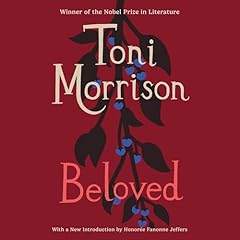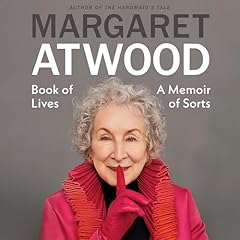
The Handmaid's Tale
No se pudo agregar al carrito
Add to Cart failed.
Error al Agregar a Lista de Deseos.
Error al eliminar de la lista de deseos.
Error al añadir a tu biblioteca
Error al seguir el podcast
Error al dejar de seguir el podcast
 Exclusivo para miembros Prime: ¿Nuevo en Audible? Obtén 2 audiolibros gratis con tu prueba.
Exclusivo para miembros Prime: ¿Nuevo en Audible? Obtén 2 audiolibros gratis con tu prueba.Compra ahora por $20.96
-
Narrado por:
-
Claire Danes
-
De:
-
Margaret Atwood
Audie Award, Fiction, 2013
Margaret Atwood's popular dystopian novel The Handmaid's Tale explores a broad range of issues relating to power, gender, and religious politics. Multiple Golden Globe award-winner Claire Danes (Romeo and Juliet, The Hours) gives a stirring performance of this classic in speculative fiction, one of the most powerful and widely read novels of our time.
After a staged terrorist attack kills the President and most of Congress, the government is deposed and taken over by the oppressive and all-controlling Republic of Gilead. Offred, now a Handmaid serving in the household of the enigmatic Commander and his bitter wife, can remember a time when she lived with her husband and daughter and had a job, before she lost even her own name. Despite the danger, Offred learns to navigate the intimate secrets of those who control her every move, risking her life in breaking the rules in hopes of ending this oppression.
Cover Art by Fred Marcellino. Used with permission of Pippin Properties, Inc.
Explore more titles performed by some of the most celebrated actors in the business in Audible’s Star-Powered Listens collection.©1985 Margaret Atwood (P)2012 Audible, Inc.Los oyentes también disfrutaron:




















Reseñas de la Crítica
“Claire Danes sparkles in this performance…Danes’s Offred is complex, and her flashes of intense strength highlight her vulnerability. This is a consuming listen, thanks to Danes’s emotional subtleties.” (AudioFile)
Featured Article: The Best Sci-Fi Audiobooks to Blast You into Another Galaxy
There’s a certain magic in losing yourself in the imaginative world of science fiction. But when new landscapes and realities are paired with brilliant audio performances, the experience is more immersive than ever. We’ve curated some of the best science fiction audiobooks, ranked not only for their vividly constructed narratives, but also for the compelling, stellar narration that brings them to life. So grab your headphones and settle in as reality fades away.
Las personas que vieron esto también vieron:


















Offred ("Of-Fred") never tells us her real name. She remembers the time before Gilead, when life was "normal." She had a husband. a daughter, a job. Now she is a Handmaid, a forced surrogate who, because she is one of the few women in the country who still has viable ovaries (Atwood never really explains what caused this widespread sterility, though it's implied that it's a result of pollution and radiation), is obligated to attempt to become pregnant by one of Gilead's Commanders. This obliges her to live in the Commander's house in a sort of veiled purdah, suffering the resentment of the Commander's wife, who has to participate in the humiliating procreation "ceremony." The way in which the Wives, supposedly free women of much higher status than the Handmaids or the Aunts or the "Marthas," are little better than chattel themselves despite their privileges, is something Atwood draws our attention to without spelling it out or hitting us over the head, but it's how we come to feel sympathy for the Commander's wife, Serena-Joy, former evangelical singer and advocate for a "Godly" society who is now angry, resentful, and bitter now that she's gotten what she supposedly wanted. Serena-Joy is just as oppressed and constrained as the Handmaids, she just has a prettier cage that lets her see sunlight through the bars.
Atwood has taken some flack for claiming at one point that she didn't write science fiction. Although she later backed off from that a bit, after reading The Handmaid's Tale, I can kind of see her point. The Handmaid's Tale is a lot like 1984, a speculative look at how very badly wrong things could go in our society, given a few flips of the historical dial, and the point is not the "alternate history" it creates but what this look at a dystopian society that maybe could be tells us. Is 1984 science fiction? Kind of — Orwell creates a new society, a new language, and mentions a few bits of technology that were futuristic at the time he wrote it. But it would be fair to say that it's not a conventional sci-fi story, at least, and that's also true of The Handmaid's Tale. Atwood isn't making up this fictional off-the-rails version of a future U.S. to do worldbuilding or as a vehicle for a tale about rebellion or resistance. The small bits of resistance in this book consist of a thought, a whispered conversation, a glimpse of a banned magazine, and like 1984, we never know if the supposed resistance is for real. Offred is no rebel; she pines for the old days, she hates her "reduced circumstances" and the reeducation she undergoes at the Rachel and Leah Center, but she is mostly a passive chronicler of her age, a vessel, a Handmaid. Things are done to her; she doesn't do things, though she occasionally fantasizes about doing them.
Atwood writes in descriptive literary prose; Offred's thoughts are poignant, heavy, mournful, occasionally smart-alecky, but mostly you just feel the oppressive claustrophobia, the daily dehumanization and erasure, and how readily a modern 20th century woman with a brash feminist mother can find herself submitting to such wholesale, brutal oppression as the new normal, clinging to memories of her old life while slowly forgetting who she used to be. Her oppression is a hundred small humiliations every day, none really cruel or violent, just things reminding her of her status, all the things she is no longer allowed to do (read, write, show her face to men, use hand lotion, talk to anyone about non-trivial matters). In this environment, the smallest conversation, a meeting of eyes, can become an act of rebellion, and Atwood shows us that repeatedly, how defiant and rebellious can be the simple act of asserting, "I am here, I exist, I am a person."
This was a chilling book precisely because there are no action scenes, there is no grand escape, there is no uprising, and you keep wanting Offred to have some way out, to see some way out for any of the people of Gilead, but there is no cavalry coming to bring down the tyrants, no Katniss Everdeens or District 13 here. It ends, arguably, on a more hopeful note than Orwell's book does, but then we've been told repeatedly by Offred herself that she is an unreliable narrator.
It was much less of a feminist polemic than I expected it to be. Yes, the points about right-wing Christians and their various fetishes were made, and Gilead is definitely a nightmare product of the very worst woman-hating religious extremists, but Atwood shows them slaughtering Catholics and Baptists as zealously as they kill abortionists and homosexuals, and there is relatively little soapboxing on the part of the author. The story says a lot of things about what happens when you take certain ideologies seriously, but it does not serve as a vehicle just to knock down those ideologies and push the author's own dubious ideas like certain other authors who tread the same ground broken by The Handmaid's Tale (I am looking at you, Sheri S. Tepper).
So, this book really does deserve to be read. I didn't even read it as a "cautionary tale," per se - it stands on its own as a work of fiction. The characters stand out as living human beings who talk and think like real human beings, because they are so ordinary, in their extraordinary "reduced circumstances." Is this science fiction? Kinda not really. But it is a very dark Bible-thumping dystopia, by a literary author who writes better dystopias than all those trying-too-hard SF authors.
Claire Danes gives a great performance as Offred, making her sad, introspective, and occasionally hysterical as the mood demands it, though something about her voice occasionally annoyed me in the way it drew me out of the writing and made me focus on the narrator.
The most ground-breaking dystopia since "1984"
Se ha producido un error. Vuelve a intentarlo dentro de unos minutos.
With the feel of "The Road" meets "1984" meets "Children of Men" (all of which I enjoyed), this was more a journal than it was a story with a beginning, middle, and end.
I'm not sure I would read this again, but I am glad that I did. Well worth my time.
Surreal yet familiar
Se ha producido un error. Vuelve a intentarlo dentro de unos minutos.
Haunting story, phenomenal narration
Se ha producido un error. Vuelve a intentarlo dentro de unos minutos.
Claire Daines is an excellent narrator.
Highly recommend this if it's been over twenty years since you last read it (like me).
Amazing
Se ha producido un error. Vuelve a intentarlo dentro de unos minutos.
Danes is brilliant
Se ha producido un error. Vuelve a intentarlo dentro de unos minutos.



